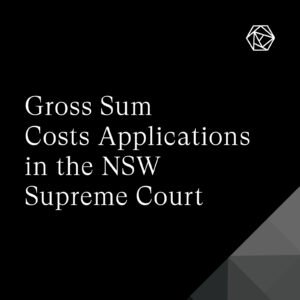
In this Insight, Paralegal Caleb Cambridge examines the growing use of gross sum costs orders in the NSW Supreme Court, offering guidance on when such orders may be appropriate, how they operate under Section 98(4)(c), and what practitioners should consider.
In New South Wales, the Supreme Court has discretion under Section 98(4)(c) of the Civil Procedure Act 2005 (NSW) to issue a gross sum costs order. This provision enables the Court to fix a specific amount payable by one party to another, bypassing the traditional process of detailed costs assessment.
What Is a Gross Sum Costs Order?
A gross sum costs order is a judicial determination in which the Court sets a fixed amount of costs to be paid by one party to another, rather than referring the matter for detailed assessment. This approach departs from the standard process, where a costs assessor examines the work performed and expenses incurred during litigation to determine the recoverable amount. By providing a final and binding figure, a gross sum order streamlines the post-litigation process and helps minimise further legal costs.
Legal Framework and Judicial Discretion
The authority to make gross sum costs orders is set out in Section 98(4)(c) of the Civil Procedure Act 2005 (NSW), which provides:
“At any time before costs are referred for assessment, the court may make an order to the effect that the party to whom costs are to be paid is to be entitled to a specified gross sum instead of assessed costs.”
This provision gives the Court broad discretion to determine whether a gross sum costs order is appropriate. In exercising this discretion, the Court typically considers factors such as the complexity of the matter, the conduct of the parties, and whether a detailed assessment would likely be protracted or costly. Judicial officers will often weigh whether a departure from the standard assessment process is justified in order to achieve a more efficient and proportionate outcome.
Practical Considerations and Case Law
In practice, gross sum costs orders are more commonly granted in matters where the litigation has been relatively straightforward, and the costs are predictable. For example, in Hoho Property Pty Ltd v Bass Finance No 37 Pty Ltd [2022], the Court awarded gross sum costs, illustrating the efficiency and finality such orders can bring to the resolution of proceedings. By contrast, in more complex or protracted cases, the Court is generally less inclined to make a gross sum order, favouring instead a detailed assessment to ensure that all aspects of the costs are properly scrutinised. This is often essential in multifaceted disputes involving substantial legal work. That said, there has been an increasing number of instances, particularly in other jurisdictions such as the Federal Court, where gross sum orders are being allowed more readily, reflecting a broader shift toward procedural efficiency.
Advantages and Limitations
Advantages
• Certainty and Finality: A gross sum order provides a definitive figure payable, reducing the likelihood of ongoing disputes over costs.
• Efficiency: By avoiding a detailed assessment, parties can save considerable time and legal expense.
• Simplicity: Particularly advantageous in straightforward matters where costs are not heavily contested.
Limitations
• Limited Applicability: Gross sum orders are generally unsuitable for complex cases requiring detailed examination of time and costs incurred.
• Potential for Lower Recovery: Without itemised assessment, significant components of a party’s costs may be overlooked, leading to a blanket reduction.
• Interest Considerations: Interest on costs, currently 10.1% per annum, accrues during the assessment period, from the date of the costs order until final determination, making detailed assessment more beneficial in some cases.
• Judicial Discretion: The outcome of any application ultimately depends on the Court’s evaluation of whether a gross sum order is appropriate in the specific circumstances.
Conclusion
Gross sum costs applications in the NSW Supreme Court present a streamlined alternative to the traditional detailed costs assessment process. While they offer benefits in terms of efficiency and certainty, their suitability depends on the nature of the case and the Court’s discretion. Parties considering this approach should assess the complexity of their matter and weigh the potential advantages of a fixed costs order.
Legal practitioners play a key role in guiding clients through this aspect of civil procedure, ensuring that any application aligns with the broader strategic objectives of the dispute.
About Caleb Cambridge, Paralegal
Caleb Cambridge is a Paralegal at Rose Legal with experience assisting the Principal Solicitor on gross sum costs applications in the NSW Supreme Court. If you have a costs order, whether pursuing or responding to one, or any other legal costs issue, our team of experts can provide tailored advice to help expedite and maximise your recovery.
